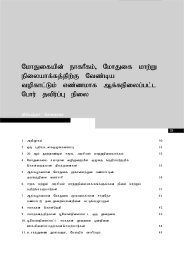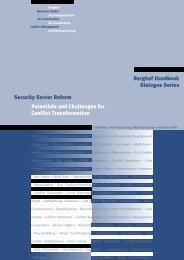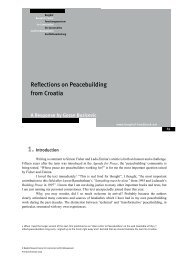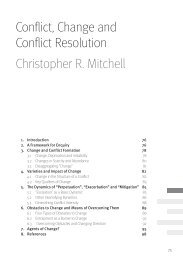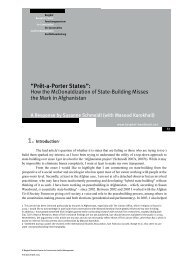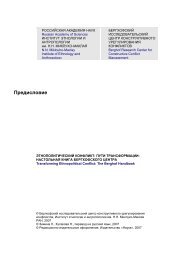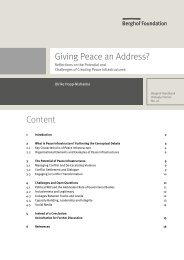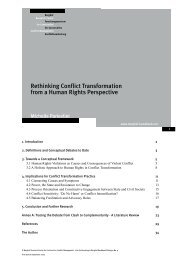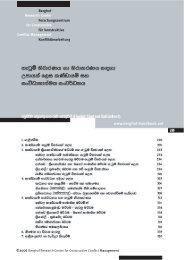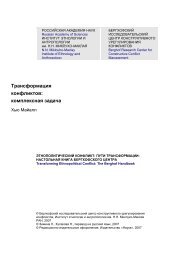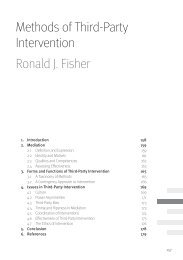Human rights and conflict transformation: The challenges of just peace
Human rights and conflict transformation: The challenges of just peace
Human rights and conflict transformation: The challenges of just peace
You also want an ePaper? Increase the reach of your titles
YUMPU automatically turns print PDFs into web optimized ePapers that Google loves.
48<br />
govern issues <strong>of</strong> power, resources, identity <strong>and</strong> security, <strong>and</strong> that determine access to <strong>and</strong> decisionmaking<br />
over such assets” (22). While we do not dispute that such structures have an important<br />
impact on the realization <strong>of</strong> human <strong>rights</strong>, in particular when it comes to second- or third-generation<br />
<strong>rights</strong>, we do find that incorporating them into the definition <strong>of</strong> human <strong>rights</strong> reduces the analytical<br />
purchase <strong>of</strong> the concept <strong>and</strong> risks losing sight <strong>of</strong> the need to investigate the effects <strong>of</strong> human <strong>rights</strong><br />
articulations as legal norms in <strong>conflict</strong>s.<br />
<strong>The</strong>refore, it seems to us that Parlevliet’s choice to integrate these other factors into the<br />
definition <strong>of</strong> human <strong>rights</strong> makes her overlook or not fully appreciate the problems <strong>of</strong> invoking<br />
human <strong>rights</strong> as a legal norm. In the following, we would like to suggest three issues that in our<br />
view warrant further discussion. First, we argue that invocations <strong>of</strong> human <strong>rights</strong> by their very nature<br />
articulate an existential threat with a view to legitimising urgent counter-action in the absence <strong>of</strong><br />
change. This explains their <strong>conflict</strong>-intensifying potential <strong>and</strong> alerts us to the political dimension <strong>of</strong><br />
such invocations. Second, we discuss the extent to which politics is excluded if human <strong>rights</strong> are<br />
seen as purely legal norms. Third, we argue that different kinds <strong>of</strong> human <strong>rights</strong> articulations can<br />
have different effects on <strong>conflict</strong>s, <strong>and</strong> that therefore the articulations themselves matter more than<br />
Parlevliet seems to suggest.<br />
1. <strong>The</strong> Nature <strong>of</strong> <strong>Human</strong> Rights as Securitising<br />
Bergh<strong>of</strong> H<strong>and</strong>book Dialogue No. 9<br />
Parlevliet acknowledges that human <strong>rights</strong> can have a <strong>conflict</strong>-intensifying effect at least<br />
in the short to medium term (27). She links this effect rightly to the challenge that the invocation<br />
<strong>of</strong> human <strong>rights</strong> poses to the dominant power relations (29) <strong>and</strong> speaks in this context <strong>of</strong> “<strong>conflict</strong><br />
sensitivity”. Her argument is, <strong>and</strong> again we agree, that considerations <strong>of</strong> such sensitivity must not<br />
lead to ignoring in<strong>just</strong>ices (30). We will discuss the possibilities <strong>of</strong> human <strong>rights</strong> articulations in such<br />
circumstances further in our third section, but want first to elaborate on why we think the invocation<br />
<strong>of</strong> human <strong>rights</strong> has this <strong>conflict</strong>-intensifying effect, even though human <strong>rights</strong> <strong>and</strong> (positive)<br />
<strong>conflict</strong> <strong>transformation</strong> are usually seen to correlate positively.<br />
<strong>The</strong> problem, in our view, lies with the rhetorical structure <strong>of</strong> human <strong>rights</strong> invocations. 1<br />
<strong>The</strong>y are by definition related to a threat to the very existence <strong>of</strong> an individual or group. As long as<br />
this existence is not seen as being threatened, there is no need to invoke human <strong>rights</strong>. Existence<br />
in this context does not necessarily refer to issues <strong>of</strong> life <strong>and</strong> death – the freedom <strong>of</strong> movement or<br />
expression can be seen as core aspects <strong>of</strong> what it means to be human, <strong>and</strong> as such their restrictions<br />
count as existential threats as much as direct threats to one’s life do.<br />
In the literature on Security Studies, such references to an existential threat are called<br />
“securitisations”. An issue is “securitised”, in the words <strong>of</strong> Buzan, Wæver <strong>and</strong> de Wilde (1998,<br />
23-24), if it “is presented as an existential threat, requiring emergency measures <strong>and</strong> <strong>just</strong>ifying actions<br />
outside the normal bounds <strong>of</strong> political procedure”. <strong>The</strong>re is <strong>of</strong> course considerable dispute over what<br />
‘emergency measures’ <strong>and</strong> ‘actions outside the normal bounds <strong>of</strong> political procedure’ may mean. Yet<br />
in the context <strong>of</strong> human <strong>rights</strong> <strong>and</strong> <strong>conflict</strong>s, successful securitisations, i.e. human <strong>rights</strong> invocations<br />
that are persuasive enough in society to have political effects, seem to have two particularly important<br />
consequences, which one could see as two extremes <strong>of</strong> what such extraordinary measures may be.<br />
On one end, increasing levels <strong>of</strong> securitisation both in terms <strong>of</strong> societal spread <strong>and</strong><br />
emergency measures are an indication <strong>of</strong> greater <strong>conflict</strong> intensity (see Diez et al. 2006, 566-568).<br />
1 This argument emerged in our early discussions with Thorsten Bonacker in the context <strong>of</strong> the SHUR project: SHUR – <strong>Human</strong><br />
Rights in Conflicts: <strong>The</strong> Role <strong>of</strong> Civil Society, see www.luiss.it/shur. This paper draws on our work in the context <strong>of</strong> this project,<br />
which was funded by the EU’s 6th Framework Programme, contract number CIT5-CT-2006-028815.






